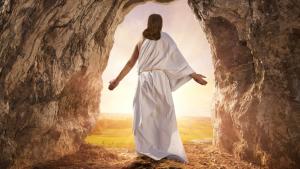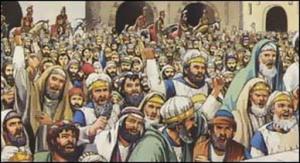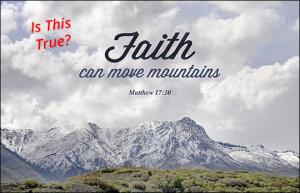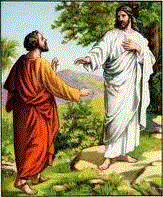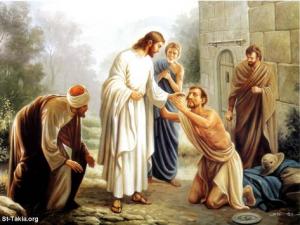
Looking at Jesus from a distance, an observer would notice one thing especially: he didn’t stay long in one place. If actions speak louder than words, one would want to understand what message Jesus’ wandering ways convey. This post traces a sort of journey in my thinking with help from John Dominic Crossan and his idea of the unbrokered kingdom.
I tend to think about Jesus’ poverty and imagine that says something important about God. Crossan, in The Historical Jesus: The Life of a Mediterranean, Jewish Peasant, brings up a more political dimension. Jesus’ itinerant lifestyle, going to where people are, replaces the usual power relations in society with an unbrokered kingdom. Brokers, intermediaries between the people and the high and mighty, are absent in the unbrokered kingdom Jesus heralds.
This is the 16th in the series “Stories of Jesus and the Character of God.” We’re looking at episodes of Jesus’ journey from Temptation to Cross. The whole series aims to find in Jesus clues to what God is like. Developing Table of Contents for the series here.
Going everywhere, but nowhere home
Jesus spoke loudest by his actions, and one typical action was to go wherever people were. It wasn’t what people expected of a charismatic religious figure. John the Baptist was more typical. He stayed in the wilderness areas along the Jordan River, eating locusts and wild honey and dressing inappropriately for social occasions. And people came to him by the hundreds or thousands.
Jesus was not comfortable when crowds came to him. Luke records that large crowds assembled after Jesus performed a miracle. They were hoping that they too would be cured of some ailment or at least be in on someone else’s good fortune. But Jesus withdrew to a secluded place to pray. (Luke 5:15-16) Another time when people from Capernaum were searching for Jesus, Jesus left saying he must preach the good news to other towns. (Mark 1:35-38)
Jesus didn’t set up shop and say “Come to me.” Instead of established figure, he enjoyed the role of wandering preacher. “Foxes have holes, and birds of the air have nests; but the Son of Man has nowhere to lay his head.” (Luke 9:58) That was Jesus’ choice.
A closer look at a “day” in Capernaum
It’s interesting to see in Jesus’ homeless state a clue to what God must be like. We think of the whole universe as God’s world, God’s possession, but does God think that way? We don’t really understand God except by looking at Jesus. In Jesus we see is one who gathers no possessions but scatters even himself among the people and towns of Galilee. Is it possible to think of a non-possessive God, a God who doesn’t have things that belong to him but instead gives himself to be possessed by all that is not God.
That is my first thought about the Jesus who has no home. John Dominic Crossan has another idea. It starts with a closer look at the “day” in Capernaum when “everyone” was searching for Jesus. Crossan thinks the day exists more in Mark’s mind than in actual fact. Mark probably brings together a number of separate incidents and adds his own color.) Here’s the story:
Jesus picks up followers around the Sea of Galilee—Simon, Andrew, James, John. All of them leave their occupations – they were fishers – and follow Jesus
They go to Capernaum, where Jesus preaches with amazing authority and exercises amazing power over an unclean spirit. At Simon and Andrew’s house the find that Simon’s mother-in-law has a fever. Jesus helps her out of bed and the fever leaves her. It’s still the Sabbath. Work is not allowed, but I guess that hardly counts as work.
That evening, after Sabbath is over, crowds come and Jesus gets down to serious work. He cures many who were sick or possessed, gaining quite a following. Surprisingly, the next morning, “while it was still very dark,” he leaves them all behind. Simon and companions find him and inform him, “Everyone is searching for you.” Jesus says he came out to go on to the neighboring towns.
The unbrokered kingdom
Crossan isn’t satisfied with the bare bones of a story where Jesus acquires an admiring crowd and then leaves them. (The Historical Jesus, p. 345-48) He looks at the crowd’s and Peter’s motivation, at typical expectations of a person with remarkable powers, and Jesus’ radical departure from the norm.
First, the expectations. The normal thing was for a person with healing powers to set up shop somewhere. It would be an efficient way to provide a service. More than that, it would be an economic boon to whatever locality could host such a facility. Crossan thinks that’s at least part of the motivation of the crowd who went in search of Jesus.
As for Peter’s motivation, Mark in several places highlights the difference between Peter’s and other apostles’ goals and those of Jesus. In every case the disciple desires a position of influence or glory. In this particular case the disciples would be the ones who organized access to Jesus and Jesus the one who created access to God’s healing power.
Crossan says that is the typical way the world organizes itself – into a hierarchy of honor and power. You go through an intermediary, a broker, or perhaps even a series of them, before you get to the one whose help you need. The radicalness of Jesus consists precisely in that people’s access to him is unbrokered. He goes to them directly. Or they come to him – even children, whom the disciples tried to keep away.
Jesus doesn’t regard himself as the ultimate broker between people and God. “The kingdom of God is among you.” (Luke 17:21) Jesus heralds an unbrokered kingdom. There must be no hierarchies in God’s kingdom. God is infinitely approachable. Well, that’s what John Dominic Crossan reads into story about events at Capernaum. I think it makes sense.
Image credit: Pinterest via Google Images



